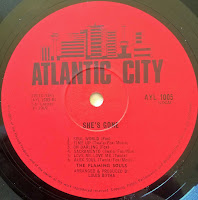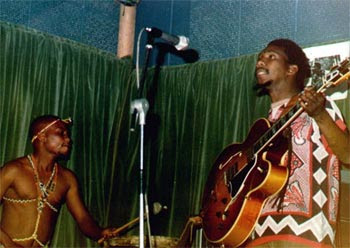Some years ago I published a compilation here at EJ titled
Maskanda Roots, that traced the history of this, often guitar-based, Zulu traditional music. In that article I mentioned Zimbabwean
omisaganda, Josaya Hadebe as one of the major influences of this style of music, though at that time I had no examples of his work. Today we feature ten tracks recorded for Trutone roughly between 1947 and 1954.
Both David Coplan and Joyce Makwenda point to the Ndebele (with their close roots to Zulu) styles in southern Zimbabwe, notably Bulawayo, as an early significant influence on
maskanda with artists such as Josaya Hadebe, George Sibanda and Sabelo Mathe.
![]() |
| Josaya Hadebe from Makwende's book |
Interestingly these Bulawayo guitarists were referred to as
omasiganda and had a distinctive country western influence modeled after the singing cowboy in American films of the time.
Omisaganga like
maskanda is derived from the Afrikaans
musikant. The
omisaganda were one-man band troubadours strolling the township streets of Bulawayo, basically busking for money. Often they were in demand as entertainers at functions such as “tea-parties”, shebeens or at venues like the Stanley Hall built in 1935.
Makwenda, in her book
Zimbabwe Township Music, actually credits Hadebe, as having introduced the
ukuvamba (vamping) style in the late 1940s when he would come to South African towns, and draw huge crowds while busking on street corners. Significantly, Hadebe’s songs, as Makwende points out, were
“about the deteriorating social values, which were a reflection of emerging city life: drunkeness, prostitution and crime”. (Makwende)
Makwende also suggests that Hadebe recorded fifteen songs with Eric Gallo, through Hugh Tracey’s AMR unit, in 1948 but I have found no examples of these. Tracks by Hadebe that I have located from this period seem to have been recorded for Trutone and I suspect that it is these that she may have been referring to.
The XU prefix on these Trutone discs is a hold-over from Llewelynn Hughes’ Better label (La Fayette Recording Studios) that was acquired by Arthur Harris around 1945. Harris was able to improve the quality of his recordings by hiring a professional sound engineer and building a new studio. Towards the end of the 1940s he changed the name of his business to Trutone. (Allingham / Meintjes)
Much of Hadebe’s material featured below was recorded in the late 1940s and early to mid 1950s. Based on the matrix number of XU 93 (2119) and the transitions at Trutone my guess is that Hadebe could have been recording for the company as early as 1947. What I suspect are the earliest known recordings by Hadebe —
Langa Shona and
Sitwande Same (XU 89) — can be found in the ILAM archive and heard at SAMAP. Jonathan Ward's compilation,
Opika Pende, also features a later track recorded by Hadebe around 1957:
Yini Wena Funa (Quality, TJ 6020, matrix T 6647-1)
Finding additional background information on Hadebe has proven to be difficult but a paper by S.J. Mhlabi titled
An African Troubadour: The Music of Josaya Hadebe has been cited in a number of publications. If anyone has a copy of this text please let us know.
JOSAYA HADEBE ON 78 RPM (c1947-1954)(flatinternational, Electric Jive, FXEJ 18)
01)
Batatazela (c1947, Trutone, XU 93, 2120-D)
02)
Ma Sheet Bed (c1947, Trutone, XU 93, 2119-D)
03)
Diana (c1948, Trutone, XU 125, 2928)
04)
Elina (c1948, Trutone, XU 125, T 2937)
05)
Cigarette (c1953, Trutone, XU 145, T 3429)
06)
iDlulamithi (c1953, Trutone, XU 145, T 3435)
07)
Hlanganisa (1954, Trutone, XU 222, T 3654)
08)
Sithandwa Same (1954, Trutone, XU 222, T 3656)
09)
iWatch Lika Baba Ligugile (1954, Trutone, XU 244, T 3666)
10)
Wazi Bamab Emarabeni (1954, Trutone, XU 244, T 3671)
MF
 Whilst Harari's discography is well documented (here and here, for example), The Beaters are only mentioned in passing as having been the same band before they became Harari.
Whilst Harari's discography is well documented (here and here, for example), The Beaters are only mentioned in passing as having been the same band before they became Harari.



























































